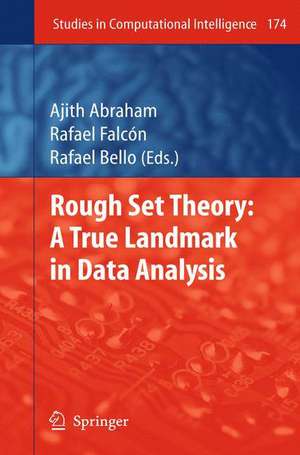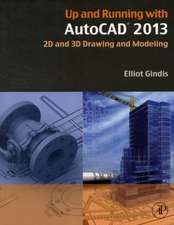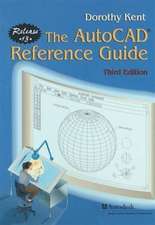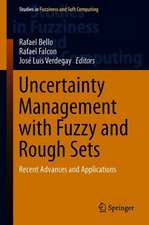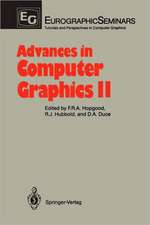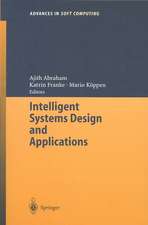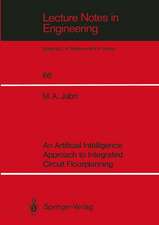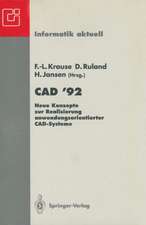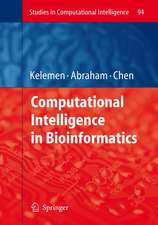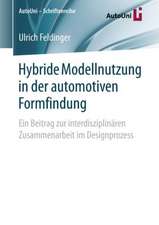Rough Set Theory: A True Landmark in Data Analysis: Studies in Computational Intelligence, cartea 174
Editat de Ajith Abraham, Rafael Falcón, Rafael Belloen Limba Engleză Hardback – 26 feb 2009
| Toate formatele și edițiile | Preț | Express |
|---|---|---|
| Paperback (1) | 969.09 lei 6-8 săpt. | |
| Springer Berlin, Heidelberg – 28 oct 2010 | 969.09 lei 6-8 săpt. | |
| Hardback (1) | 975.39 lei 6-8 săpt. | |
| Springer Berlin, Heidelberg – 26 feb 2009 | 975.39 lei 6-8 săpt. |
Din seria Studies in Computational Intelligence
- 50%
 Preț: 264.48 lei
Preț: 264.48 lei - 70%
 Preț: 235.75 lei
Preț: 235.75 lei - 20%
 Preț: 1134.78 lei
Preț: 1134.78 lei - 20%
 Preț: 966.66 lei
Preț: 966.66 lei - 20%
 Preț: 1423.29 lei
Preț: 1423.29 lei - 20%
 Preț: 168.78 lei
Preț: 168.78 lei - 18%
 Preț: 1089.74 lei
Preț: 1089.74 lei - 20%
 Preț: 565.38 lei
Preț: 565.38 lei - 20%
 Preț: 636.14 lei
Preț: 636.14 lei - 20%
 Preț: 1026.49 lei
Preț: 1026.49 lei - 20%
 Preț: 1546.90 lei
Preț: 1546.90 lei - 20%
 Preț: 630.47 lei
Preț: 630.47 lei - 20%
 Preț: 644.20 lei
Preț: 644.20 lei - 20%
 Preț: 973.14 lei
Preț: 973.14 lei - 20%
 Preț: 970.73 lei
Preț: 970.73 lei - 20%
 Preț: 969.90 lei
Preț: 969.90 lei - 20%
 Preț: 1142.04 lei
Preț: 1142.04 lei - 20%
 Preț: 1415.20 lei
Preț: 1415.20 lei - 20%
 Preț: 1020.82 lei
Preț: 1020.82 lei - 20%
 Preț: 1026.49 lei
Preț: 1026.49 lei - 20%
 Preț: 1024.85 lei
Preț: 1024.85 lei - 18%
 Preț: 2449.69 lei
Preț: 2449.69 lei - 20%
 Preț: 969.09 lei
Preț: 969.09 lei - 20%
 Preț: 1142.04 lei
Preț: 1142.04 lei - 20%
 Preț: 1140.44 lei
Preț: 1140.44 lei - 20%
 Preț: 1021.64 lei
Preț: 1021.64 lei - 20%
 Preț: 1430.55 lei
Preț: 1430.55 lei - 18%
 Preț: 1375.05 lei
Preț: 1375.05 lei - 18%
 Preț: 1102.11 lei
Preț: 1102.11 lei - 20%
 Preț: 1018.40 lei
Preț: 1018.40 lei - 20%
 Preț: 987.68 lei
Preț: 987.68 lei - 20%
 Preț: 1024.07 lei
Preț: 1024.07 lei - 20%
 Preț: 1249.53 lei
Preț: 1249.53 lei - 20%
 Preț: 1019.22 lei
Preț: 1019.22 lei - 20%
 Preț: 968.30 lei
Preț: 968.30 lei - 20%
 Preț: 1146.08 lei
Preț: 1146.08 lei - 20%
 Preț: 1138.80 lei
Preț: 1138.80 lei - 20%
 Preț: 1037.78 lei
Preț: 1037.78 lei - 20%
 Preț: 1140.44 lei
Preț: 1140.44 lei - 20%
 Preț: 1142.87 lei
Preț: 1142.87 lei - 20%
 Preț: 1429.76 lei
Preț: 1429.76 lei - 18%
 Preț: 985.35 lei
Preț: 985.35 lei - 20%
 Preț: 977.17 lei
Preț: 977.17 lei - 20%
 Preț: 1034.54 lei
Preț: 1034.54 lei - 20%
 Preț: 1258.40 lei
Preț: 1258.40 lei - 20%
 Preț: 974.89 lei
Preț: 974.89 lei - 20%
 Preț: 1027.45 lei
Preț: 1027.45 lei - 20%
 Preț: 924.65 lei
Preț: 924.65 lei - 20%
 Preț: 1149.31 lei
Preț: 1149.31 lei - 20%
 Preț: 1428.13 lei
Preț: 1428.13 lei
Preț: 975.39 lei
Preț vechi: 1219.23 lei
-20% Nou
Puncte Express: 1463
Preț estimativ în valută:
186.67€ • 193.90$ • 155.06£
186.67€ • 193.90$ • 155.06£
Carte tipărită la comandă
Livrare economică 01-15 februarie 25
Preluare comenzi: 021 569.72.76
Specificații
ISBN-13: 9783540899204
ISBN-10: 3540899200
Pagini: 340
Ilustrații: XVI, 324 p.
Dimensiuni: 155 x 235 x 24 mm
Greutate: 0.65 kg
Ediția:2009
Editura: Springer Berlin, Heidelberg
Colecția Springer
Seria Studies in Computational Intelligence
Locul publicării:Berlin, Heidelberg, Germany
ISBN-10: 3540899200
Pagini: 340
Ilustrații: XVI, 324 p.
Dimensiuni: 155 x 235 x 24 mm
Greutate: 0.65 kg
Ediția:2009
Editura: Springer Berlin, Heidelberg
Colecția Springer
Seria Studies in Computational Intelligence
Locul publicării:Berlin, Heidelberg, Germany
Public țintă
ResearchCuprins
Theoretical Contributions to Rough Set Theory.- Rough Sets on Fuzzy Approximation Spaces and Intuitionistic Fuzzy Approximation Spaces.- Categorical Innovations for Rough Sets.- Granular Structures and Approximations in Rough Sets and Knowledge Spaces.- On Approximation of Classifications, Rough Equalities and Rough Equivalences.- Rough Set Data Mining Activities.- Rough Clustering with Partial Supervision.- A Generic Scheme for Generating Prediction Rules Using Rough Sets.- Rough Web Caching.- Software Defect Classification: A Comparative Study of Rough-Neuro-fuzzy Hybrid Approaches with Linear and Non-linear SVMs.- Rough Hybrid Models to Classification and Attribute Reduction.- Rough Sets and Evolutionary Computation to Solve the Feature Selection Problem.- Nature Inspired Population-Based Heuristics for Rough Set Reduction.- Developing a Knowledge-Based System Using Rough Set Theory and Genetic Algorithms for Substation Fault Diagnosis.
Textul de pe ultima copertă
Along the years, rough set theory has earned a well-deserved reputation as a sound methodology for dealing with imperfect knowledge in a simple though mathematically sound way. This edited volume aims at continue stressing the benefits of applying rough sets in many real-life situations while still keeping an eye on topological aspects of the theory as well as strengthening its linkage with other soft computing paradigms. The volume comprises 11 chapters and is organized into three parts. Part 1 deals with theoretical contributions while Parts 2 and 3 focus on several real world data mining applications. Chapters authored by pioneers were selected on the basis of fundamental ideas/concepts rather than the thoroughness of techniques deployed. Academics, scientists as well as engineers working in the rough set, computational intelligence, soft computing and data mining research area will find the comprehensive coverage of this book invaluable.
Caracteristici
Reports recent research results in rough set research Includes supplementary material: sn.pub/extras
